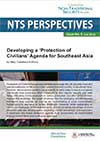31 January 2011
- RSIS
- Publication
- RSIS Publications
- NTS Perspectives (Issue No. 5 – Jan 2011) | Developing a ‘Protection of Civilians’ Agenda for Southeast Asia
Abstract
Protection of Civilians has gained prominence through the UN Security Council’s operationalisation of the norm in the context of armed conflict. In Southeast Asia, however, where armed conflicts are presently all intra-state in nature and where individuals face numerous other challenges to their dignity, security and well-being, the utility of this approach to civilian protection can often prove limited. Against this backdrop, this paper proposes that the emerging ASEAN regional framework may provide an avenue for consolidating a more broad-based, human security approach to civilian protection. However, while capitalising on recent developments at the regional level, as well as taking advantage of more proactive attitudes among states regarding conflict prevention and resolution, is important, this broad protection agenda must nonetheless be implemented through a multi-level and multi-actor approach.
Abstract
Protection of Civilians has gained prominence through the UN Security Council’s operationalisation of the norm in the context of armed conflict. In Southeast Asia, however, where armed conflicts are presently all intra-state in nature and where individuals face numerous other challenges to their dignity, security and well-being, the utility of this approach to civilian protection can often prove limited. Against this backdrop, this paper proposes that the emerging ASEAN regional framework may provide an avenue for consolidating a more broad-based, human security approach to civilian protection. However, while capitalising on recent developments at the regional level, as well as taking advantage of more proactive attitudes among states regarding conflict prevention and resolution, is important, this broad protection agenda must nonetheless be implemented through a multi-level and multi-actor approach.





